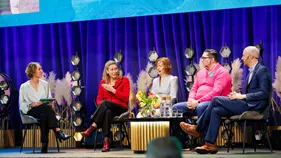Spotlight on conflict minerals
Reporting back from the OECD Responsible Mineral Supply Chains Forum in Paris.

This week I am in Paris, invited to the OECD Global Forum for Responsible Minerals, one of few Nordic representatives at an event that gathers hundreds of experts from around the globe. Sharing this adventure with me, fellow ‘sustainability pros’ Andreas Rydell and Louise Åhlman.
Responsible sourcing of minerals is a very important topic for Atea and for IT departments across Sweden, ever since we launched our ‘Upprop’ in 2014. In my role as manager for supply chain sustainability, it is critical to stay up to speed with the many actors and partnerships in this field. This to ensure that we are effective and thorough in our suppliers’ assessment. Even more importantly, I am here to get an understanding of the big picture: is scrutiny and due diligence improving the conditions for the millions people who sustain their families through mining?
Here are my findings, for all of you that have been following this issue closely.
The global spotlight on conflict minerals is as strong and bright as ever
And this is so even if one of the key legal instruments – Dodd-Frank – the first to bring this issue to the spotlight – is under attack. During the spring, we have seen investors, companies and consumers globally gather together to ‘defend’ Dodd-Frank, or at least its core principles. State Department is even conducting a consultation on the future of this instrument. The era of big US scrutiny and engagement in the Great Lakes may not be over just yet!
Thankfully, Dodd-Frank is no longer the only show in town when it comes to minerals supply chains. In the Great Lakes, countries like Rwanda are establishing strong regulatory systems on paper and in practice and the DRC – we heard this week – won’t step back from its commitments. The EU is soon to publish its first legislation on the import of raw and refined minerals into the single market, and although not far reaching as some actors would have hoped, this law represents a positive step in the right direction. And China - by far the most important global actor in the minerals supply chain - is a flurry of activities, establishing standards, guidance and tools that apply to thousands of mining companies, traders, refiners and manufacturing companies. It is actually very encouraging to see a significant Chinese presence at the Forum.
Concrete improvements are being demonstrated
Some 5 years of investments in schemes for minerals tracing, coupled with many activities at the community level, have proven that ‘responsible sourcing’ is possible, even from challenging environments like Eastern Congo. This does not mean ‘conflict free products’. Rather, that a higher proportion of minerals found for example in electronics is sourced by serious actors from sources that are being monitored and certified. At these sites, miners’ security is significantly improving.
Many of the minerals entering our supply chain are mined artisanally, and interventions that help these miners legally access the formal market, as is the case with Gold in Colombia, are bringing significant economic and social benefits to these miners.
The focus is shifting towards new priorities
In the Great Lakes in particular, the focus is on reducing the costs of traceability, improving information flows to reduce corruption risks and addressing impunity, beyond some more structural interventions around for example child labour in the cobalt supply chain.
New risks areas are emerging, in countries such as Myanmar (Burma) – now the third largest sourcing country for tin - Indonesia and Bolivia – where companies may have overlooked environmental and social risks, including child labour. This has prompted leading companies within EICC – and Atea with them – to establish a new initiative called Responsible Raw Materials initiative, to work more strategically across a broader set of risks, minerals and geographies.
Wonder what you can do?
The role of the market is vital in providing incentives for companies to act.
- Require that suppliers follow the OECD Due Diligence Guidance - to this date the most comprehensive international framework
- Recycle your electronics – there’s more gold in 1 ton of circuit board than in 1 ton of gold ore
- Stay tuned – we are not done stepping up our efforts, you will soon hear more from us!
For more info about our work please visit www.atea.se


